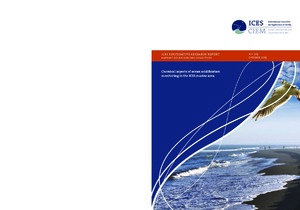Chemical aspects of ocean acidification monitoring in the ICES marine area.

View/
Average rating
votes
Date
2013Editor
Hydes, David J.
McGovern, Evin
Walsham, Pamela
Status
PublishedPages
78pp.
Metadata
Show full item recordAbstract
It is estimated that oceans absorb approximately a quarter of the total anthropogenic
releases of carbon dioxide to the atmosphere each year. This is leading to acidification
of the oceans, which has already been observed through direct measurements. These
changes in the ocean carbon system are a cause for concern for the future health of
marine ecosystems. A coordinated ocean acidification (OA) monitoring programme is
needed that integrates physical, biogeochemical, and biological measurements to
concurrently observe the variability and trends in ocean carbon chemistry and evaluate
species and ecosystems response to these changes. This report arises from an
OSPAR request to ICES for advice on this matter. It considers the approach and tools
available to achieve coordinated monitoring of changes in the carbon system in the
ICES marine area, i.e. the Northeast Atlantic and Baltic Sea.
An objective is to measure long-term changes in pH, carbonate parameters, and saturation
st.....
Publisher
International Council for the Exploration of the Sea (ICES)Copenhagen, Denmark
Series;Nr
ICES Cooperative Research Report; 319Document Language
enSustainable Development Goals (SDG)
14.3Essential Ocean Variables (EOV)
Inorganic carbonBest Practice Type
Best PracticeManual (incl. handbook, guide, cookbook etc)
DOI Original
https://doi.org/10.17895/ices.pub.5488Citation
Hydes, D. J.; McGovern, E. and Walsham, P. (eds) (2013) Chemical aspects of ocean acidification monitoring in the ICES marine area. ICES Cooperative Research Report, No. 319, 78pp. DOI: https://doi.org/10.17895/ices.pub.5488Collections
 Repository of community practices in Ocean Research, Applications and Data/Information Management
Repository of community practices in Ocean Research, Applications and Data/Information Management